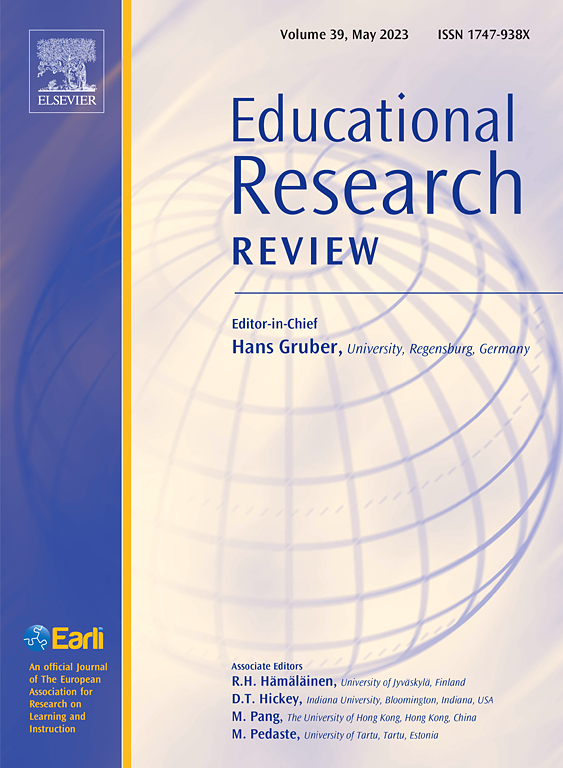A meta-analysis of the correlation between professional learning communities and teachers’ efficacy beliefs
IF 10.6
1区 教育学
Q1 EDUCATION & EDUCATIONAL RESEARCH
引用次数: 0
Abstract
A burgeoning body of literature has explored the correlation between professional learning communities (PLCs) and teachers' efficacy beliefs (TEB). However, the findings are inconsistent, posing challenges to both theoretical understanding and practical implications of the roles of PLCs in education. Adopting a meta-analytical approach, this study synthesized data from 44 independent samples (N = 38,669) to investigate the correlation between PLCs and TEB. Our analysis revealed a statistically significant positive correlation (r = .40) overall. Furthermore, our analysis of relative weights highlighted notable variability in the significance of different dimensions of PLC, with a predominant emphasis on collective focus on student learning (31.76%) and reflective dialog (24.26%) as the primary contributors to TEB. Our findings also showed that PLCs exhibited a stronger correlation with teachers’ collective efficacy beliefs (TCEB) than with self-efficacy beliefs (TSEB). The study also identified the moderating effects of certain cultural dimensions, such as power distance and collectivism, on the correlation between PLCs and TEB. We found that PLCs had a stronger positive correlation to TEB in societies with high power distance and low individualism compared to those with low power distance and high individualism. These results consolidate existing research findings of PLCs, and provide directions for further inquiries to advance the understanding of and research into PLCs.
专业学习社群与教师效能感信念相关的元分析
越来越多的文献探讨了专业学习社区(plc)与教师效能信念(TEB)之间的关系。然而,研究结果并不一致,这对plc在教育中的作用的理论理解和实践意义都提出了挑战。采用荟萃分析方法,本研究综合了44个独立样本(N = 38,669)的数据,以研究plc与TEB之间的相关性。我们的分析显示,总体上有统计学意义的正相关(r = 0.40)。此外,我们对相对权重的分析突出了PLC不同维度的显著差异,主要强调集体关注学生学习(31.76%)和反思性对话(24.26%)是TEB的主要贡献者。我们的研究结果还显示,plc与教师集体效能信念(TCEB)的相关性强于与自我效能信念(TSEB)的相关性。该研究还确定了某些文化维度,如权力距离和集体主义,对plc和TEB之间的相关性的调节作用。我们发现,与低权力距离和高个人主义社会相比,高权力距离和低个人主义社会的plc与TEB有更强的正相关。这些结果巩固了plc的现有研究成果,并为进一步的调查提供了方向,以促进对plc的理解和研究。
本文章由计算机程序翻译,如有差异,请以英文原文为准。
求助全文
约1分钟内获得全文
求助全文
来源期刊

Educational Research Review
EDUCATION & EDUCATIONAL RESEARCH-
CiteScore
19.40
自引率
0.90%
发文量
53
审稿时长
57 days
期刊介绍:
Educational Research Review is an international journal catering to researchers and diverse agencies keen on reviewing studies and theoretical papers in education at any level. The journal welcomes high-quality articles that address educational research problems through a review approach, encompassing thematic or methodological reviews and meta-analyses. With an inclusive scope, the journal does not limit itself to any specific age range and invites articles across various settings where learning and education take place, such as schools, corporate training, and both formal and informal educational environments.
 求助内容:
求助内容: 应助结果提醒方式:
应助结果提醒方式:


